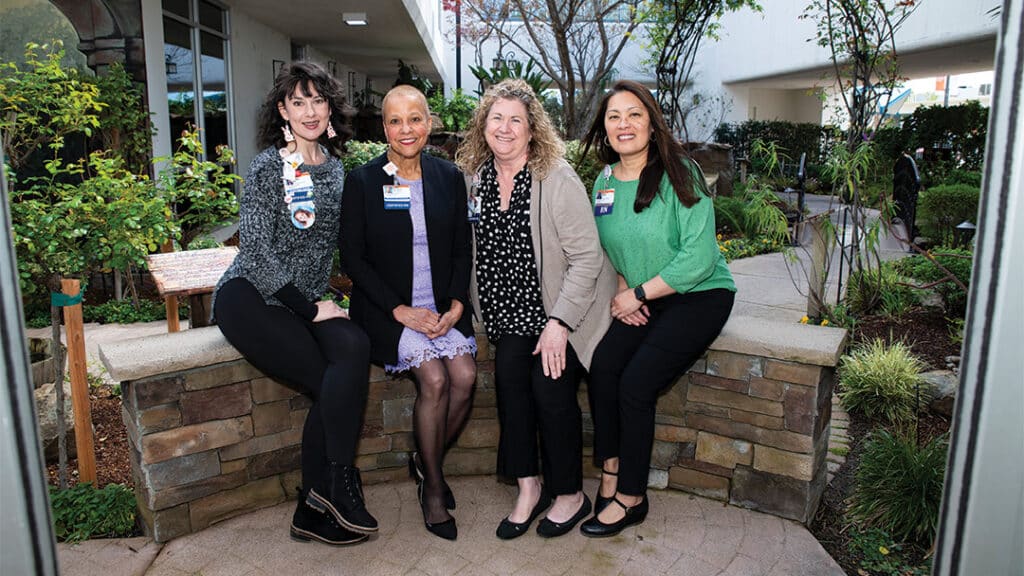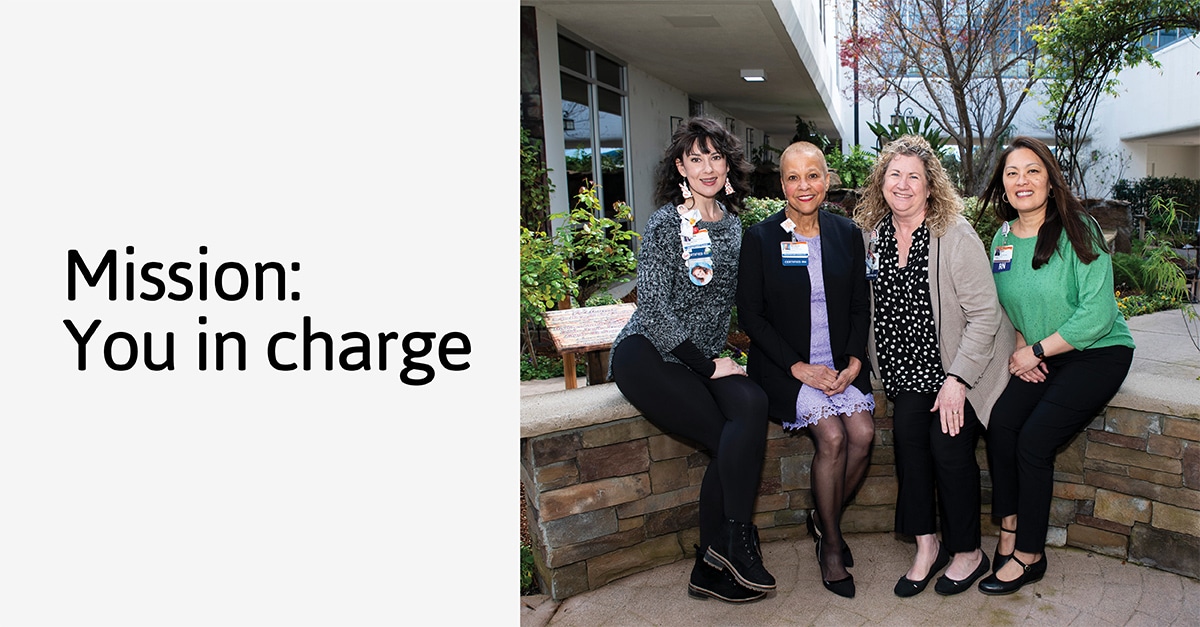Mission: You in Charge
Michele Woods and the Mercy Palliative Care Team…
Michele Woods had been quite content with her work as a cancer nurse when her boss at Mercy Medical Center Redding, Sister Brenda O’Keeffe, suggested she change course to palliative care. She admits to a little resistance because she was experienced and quite good in a cancer ward, having gotten her start at Sloan Kettering Cancer Center in 1975 and further honing her skills at Loma Linda University over a few decades.
She also admits to a trust and respect for Sr. O’Keeffe that made her take the request seriously. In 2014, she heeded the call and became a Palliative Care Coordinator at Mercy. “It’s the toughest job I’ve ever had,” she says with one breath. In another, she adds, “I’m absolutely on fire and passionate about what I do. And I say ‘I’ but it’s really ‘we.’”

Palliative care is also misunderstood, and Woods and her team are eager to help people better connect to it. “Palliative care is a specialized form of care that helps people live with a very serious, life-threatening illness,” she says. “It’s action driven. It’s not a sedentary type thing.” The emphasis is on living. “It’s that grey area in a black-and-white world,” she adds. “It gives people options. It’s not hospice. It’s aligned with each individual’s goals of care.”
It takes only a few minutes in conversation with Woods to see why Sr. O’Keeffe was determined to have her develop the palliative care program. Woods emphasizes the value of her colleagues and importance of multi-disciplinary cooperation. She takes a patient-centered approach and sits bedside with them. “I never stand,” she says. “Standing is power.” She notes the root of palliative is “palliare,” which means “to cloak” or “to wear a layer of protection or comfort.”
Together with registered nurses Mary Beasley, Callie Simons and Erin Reglin, Woods coordinates with Chief Medical Officer and Director of Palliative Care Jerry Myers, MD, to find the best solutions with the patients themselves. “My job as a palliative care coordinator is to bring their power out,” she says. Her philosophy with patients is always, ‘Let’s figure this out so you can be in charge.’”
The team works on an inpatient basis only, with a goal of setting a patient up with a positive plan upon release from the hospital. “Palliative care aligns with patients, hopefully, at the beginning of their illness,” she says. The team focuses on issues of symptom management such as pain, nausea, anxiety, restlessness, shortness of breath, fatigue, sleeplessness and much more. It’s important to develop a rapport so a patient will think to bring the issues up to be addressed.
“We don’t wear uniforms,” says Woods. And while she was unsure about leaving the symbol of her beloved profession behind, she notes that patients often feel more comfortable with her dressed in regular attire.

“We must talk about the emotional impact of what they’re going through,” Woods says of her patients. “I honor their time and I respect it. I often ask, ‘Tell me what this has done to you. Tell me what this has done to your life since your diagnosis.’”
“It’s our new perspective on illness,” she adds. “I’m so proud of the people at Mercy. Palliative care brings me immense joy. This role is a mission.”
Despite having years of experience and education, Woods invested the time to earn another 64 units of training in her new field to become certified in palliative care, all while maintaining a full-time job. While she admits it was an exhausting endeavor, she is grateful to now be working in a way that allows patients to “make good decisions with their values and goals.” She has the added benefit of working with their families and caregivers. “It’s such amazing, sacred work. Everything is different,” she says.
“People who get palliative care typically live longer,” she adds. “They have a longer life expectancy because we’re managing symptoms. There’s less anxiety and depression because they start to feel some control.”
Woods says she always keeps Sr. O’Keeffe’s most salient advice at heart. “Make everything a sacred act,” she said. It’s clear Woods knows how to live that philosophy. “This is heart nursing,” she says. “Nursing from the heart.”•




